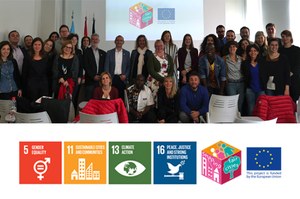The Training of Trainers in Valencia successfully completed
Thirty 'future trainers' from all municipalities and partner regions of the Shaping Fair Cities project participated to the Training of Trainers in Valencia, with the aim of preparing themselves to train public servants, local authorities, representatives of civil society organizations, citizens and all the actors involved in the implementation of the 2030 Agenda in their own territories.
The University of Bologna opened the five days of training with the presentation of the results of the surveys carried out in the partner cities (Modena, Reggio Emilia, Forlì, Pemba, Vejle, Falköping, Spalato and Iasi), to investigate the public opinion and awareness of the sustainable development (SDGs) of the 2030 Agenda, in relation to the great migratory flows and the role that cities should play in facing these challenges. In particular: the methodology and the samples used, the opinions and data collected on the actual knowledge of the SDGs by the interviewees were presented and discussed. In addition to the survey results report, UNIBO presented two other important tools for the implementation of SDGs at local level: the Training Toolkit and Training Curriculum, aimed to systematise case studies, suggestions, experiences and good practices, on the base of the materials collected and activities carried out within the project.
Two full days were dedicated to the localization experience of the 2030 Agenda of the Generalitat Valenciana, one of the first regional governments in Europe to engage in the implementation of sustainable development goals through a structured and widely shared local agenda. Many interventions, introduced and coordinated by the Head of the Generalitat Valenciana Cooperation and Solidarity Service, Roger Navarro: among the NGOs invited to share their own successful experiences, the Alianza por la Solidaridad, the Valencian Community Fons Valencià for Solidaritat and the MUSOL Foundation; among the addressed case studies, those of the municipalities of Mislata and Quart de Poblet; among the representatives of the institutions called to intervene, Bartolomé Nofuentes, Regional Councilor for economic resources and European projects of the Generalitat Valenciana, and Federico Buyolo García, Director General of the Office of the High Commissioner for the 2030 Agenda of the Spanish Government.
In addition to the exemplary case of the Generalitat Valenciana, the experiences in the local implementation of SDGs in the other partner regions and cities have been presented and discussed, according to the exchange and sharing approach at the base of the methodology chosen for this training: from the case of Vejle, a Danish city selected among the "100 resilient cities" recognized and financed by the Rockefeller Foundation, to the commitment of Pemba, in Mozambique, in the fight against climate change, which caused disastrous floods throughout the country, to name only two of the partners invited to illustrate good practices and strategies for localizing the Agenda in their respective territories.
The English translation of all the materials and tools produced and presented during the Training of Trainers will be made available to the project partners, and on the web for public access.
For more info see the PROGRAM (pdf, 169.6 KB)

